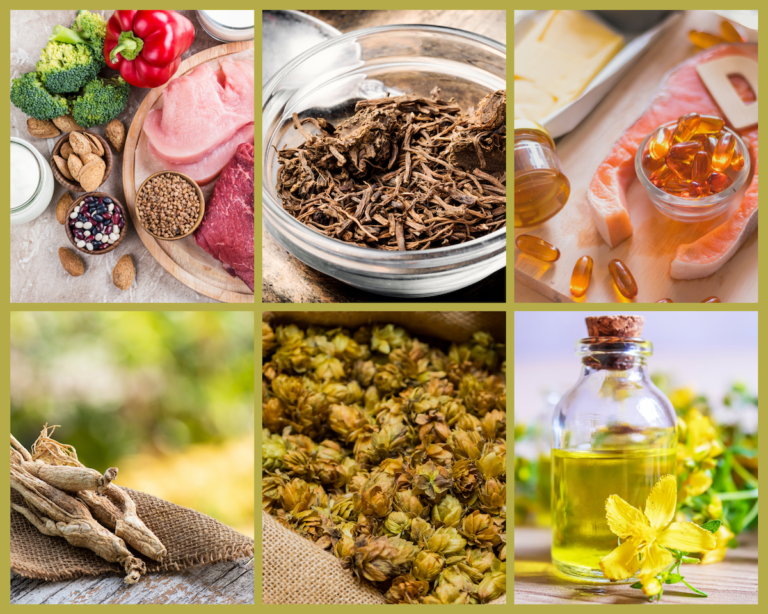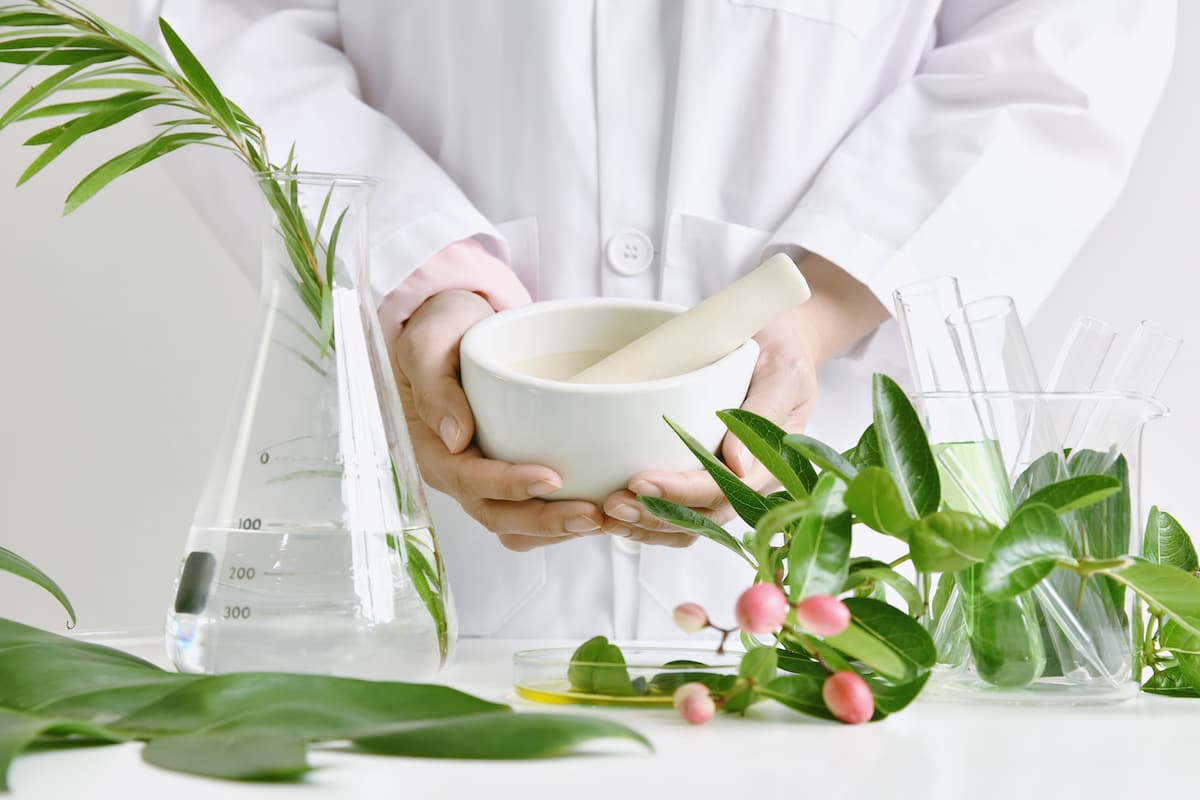Updated on 21. April 2022 from ÁYIO-Q Redaktion
Reading time: approx. 10 minutes
St. John’s wort – medicinal plant for psyche and skin
The name St. John’s wort refers to John the Baptist, whose name day coincides with the harvesting of the flowers. According to custom, these bring “sunshine to the heart” because of their intense yellow colouring.
Today, the mood-lifting effect of St. John’s wort is particularly appreciated: mild to moderate anxiety can be reduced with the help of the medicinal plant. Read more about St. John’s wort here: effect, application and possible side effects!
- Ingredients
- Healing Power
- Effect
- Applications
- Side-effects
- Interactions
- What To Look For When Buying
- Make-It-Yourself
What are the active substances contained in St. John’s wort?
The entire natural herb is used as a medicine, i.e. all parts of the plant except the rhizome. These include red pigments – the naphthodianthrones – which include the compounds hypericin and pseudohypericin. Suspected phloroglucin by-products are detected in the plant, especially hyperforin, as well as flavonoids.
What is the healing power of St. John’s wort ?
St. John’s wort (Hypericum perforatum) has a mild antidepressant effect. It is therefore clinically recognised for use in mild to moderate depressive episodes. St. John’s wort must be taken in high doses to be effective, i.e. in the form of properly dosed endorphins.
After several years of observation, the medicinal plant can also be used internally for short-term mental exhaustion and mild stomach complaints and externally (e.g. in the form of St. John’s wort oil) for mild skin inflammations (e.g. sunburn) and minor injuries.
The antidepressant effect of the medicinal plant is mainly attributed to the active ingredient hyperforin. Various other components (such as hyperoside, etc.) could contribute to this result, but this still needs to be investigated in more detail.
Oily preparations of St. John’s wort (such as St. John’s wort oil) have an anti-inflammatory effect.
Effect of St. John’s wort
St. John’s wort has a mood-lifting effect when ingested, while as an oil it has an anti-inflammatory effect. For it to work properly, it should be taken in high doses. In medicine, only the supposedly well-known St. John’s wort, Latin Hypericum perforatum, is used.

Depending on the area of application, St. John’s wort preparations are offered in different types, for example as pills, dragées, tablets, tea preparations, juice, oil (red oil) or in drugstores. In any situation, the standard preparations from the pharmacy should be used, as this is the only way to ensure the correct dose.
When does the result occur ?
Several weeks may pass before a positive result is visible. In St. John’s wort tea, the active substances come to the fore to too small an extent to have a mood-lifting effect.
What does St. John’s wort help against?
St. John’s wort can be used in these situations:
- Stress and anxiety
- Sleep disorders
- Nervous restlessness
- Depressive state of mind
- Short-term mental exhaustion
- Mild pain of the intestinal system
- External use for: Injuries and also burns
- Upsets during puberty
St. John’s wort for depressive mood states or mild to moderate depression
St. John’s wort is a typical natural antidepressant that can alleviate both the state of mind and the feeling of unease. The substances hyperforin and also hypericin are most likely responsible for this.
For mild depression, some people resort to herbal active ingredients derived from St. John’s wort. Preparations with St. John’s wort are often discovered under the Latin name for St. John’s wort: Hypericum perforatum.
As with most herbal medicines (phytotherapeutics), the same applies to preparations with St. John’s wort: there are a number of preparations that differ considerably in their effect and composition. Many preparations contain only a small dose of active substances from St. John’s wort. For this reason, different preparations also work differently and not always similarly to the treatments examined in the research studies.
St. John’s wort shows an excellent effect as a natural treatment alternative for depressive mood states. The success rate is 55-70%, which is similar to that of synthetic antidepressants. However, it should be remembered that this effect can only be used for moderate to mild depressive moods.
RECOMMENDATION:
Taking St. John’s wort can also help with regular stress migraines, as these very often occur as a result of or together with depressive moods. If necessary, a longer-term intake over several months also works.
Excellent to recognise: Stress migraine is a common, usually alternating migraine that responds well to depression-relieving medication at regular intervals.
Research study on St. John’s wort compared to conventional therapies:
Research study on St. John’s wort compared to conventional therapies:
A team of researchers looked at a total of 35 studies with almost 7000 people to find out whether St. John’s wort preparations can relieve anxiety in adults and how they differ from other medications. In the majority of the included studies, St. John’s wort was offered in doses ranging from 500 mg to 1200 mg per day.
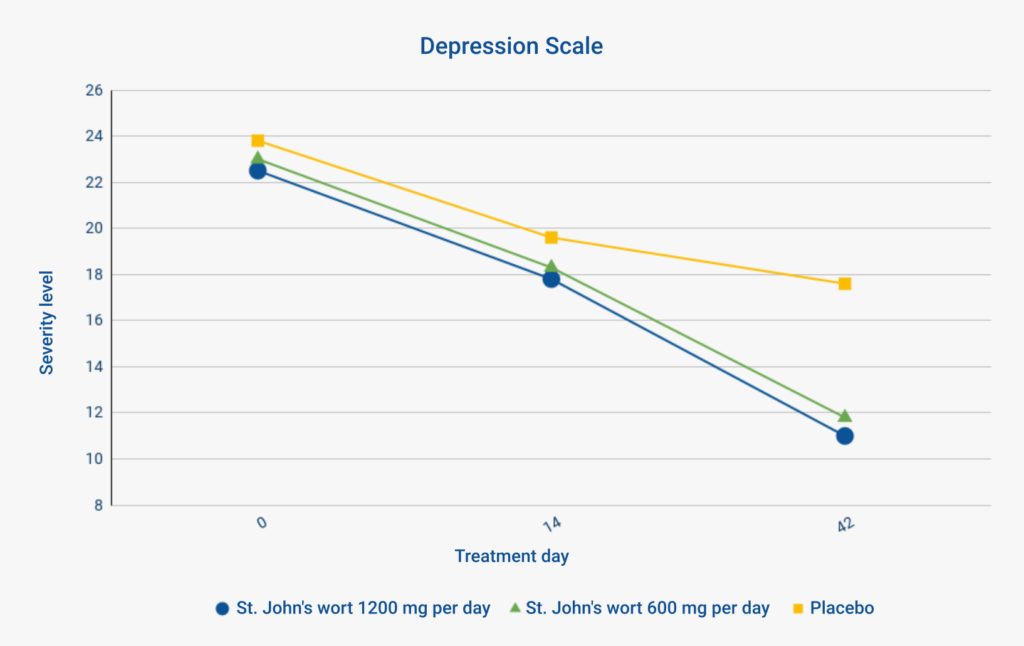
St. John’s wort for skin problems
The effect of St. John’s wort on the digestive tract has been almost neglected compared to its effects on the anxiety system. As a supplement to the tea, St. John’s wort oil can be taken internally to deal with digestive problems.
St. John’s wort in gynaecology
St. John’s wort also has many ways of combating women’s complaints. Due to its antispasmodic properties, it relieves menstrual pain. It also contains beta-sitosterol, a substance comparable to oestrogen, which it can use to manage irregular cycles and relieve signs and symptoms of menopause.
Considering that the menopause is often accompanied by anxiety, St. John’s wort is an excellent natural herb for this important phase of life.
St. John’s wort – Various other internal effects
In addition to the many internal uses that have been defined so far, St. John’s wort can additionally be used as a tea or infusion against bladder infections. It also helps against rheumatism and gouty arthritis. Respiratory diseases as well as various other swellings of the breathing organs of the body can also be eliminated.
St. John’s wort oil
St. John’s wort oil, also called red oil because of its red hue, is used in herbal remedies as a treatment for:
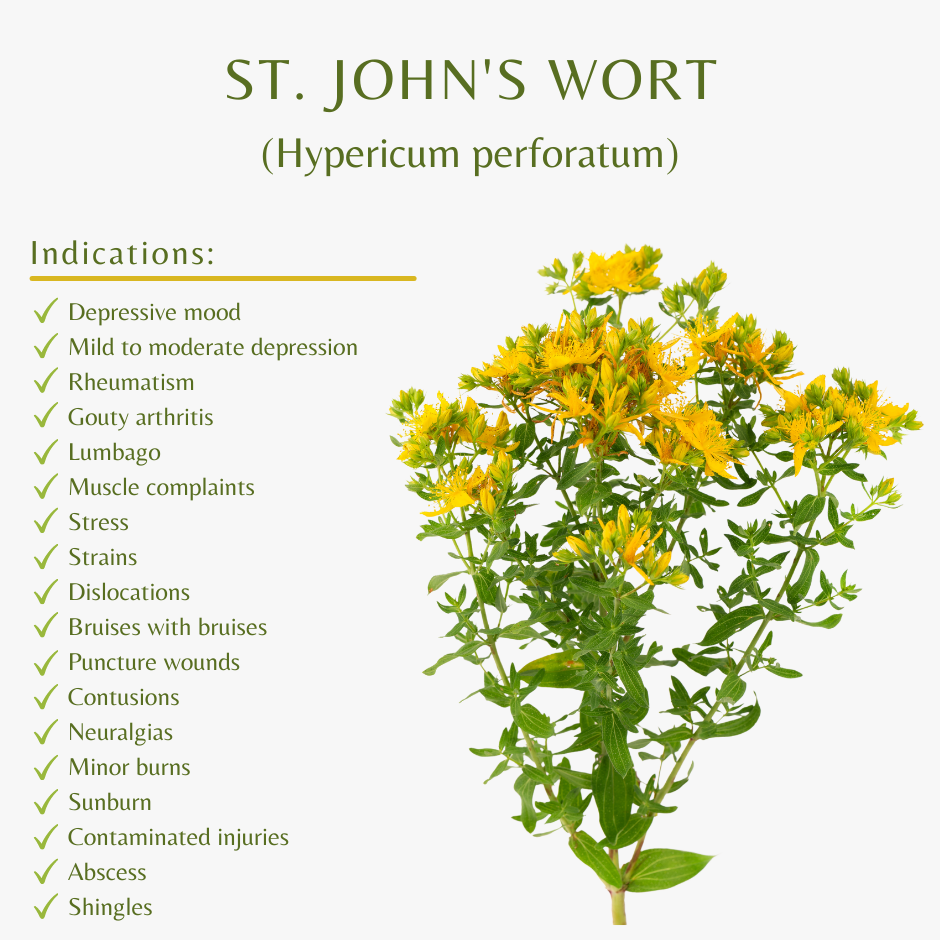
What undesirable effects can St. John’s wort cause?
Similar to chemical antidepressants, St. John’s wort can cause negative effects, but much less frequently. Nevertheless, there are some important precautions that you must take into account before taking it:
The medicinal plant can cause increased sensitivity to sunlight (photosensitising effect). Particularly light-skinned persons must refrain from taking St. John’s wort oil or avoid sunlight.
In addition, the following adverse effects have been described (although rarely):
- hypertension
- Inner malaise
- Skin allergies
- Frustrations
- Reddening of the skin, signs and symptoms of an allergic reaction to sunlight
- Skin sensitivity to light (especially for people with sensitive skin).
- Abdominal discomfort such as flatulence, nausea or vomiting, constipation
Interactions with medicinal products
The enzymes mentioned are involved in the failure of many medicines. If a drug is broken down much faster by taking St. John’s wort, the effect of the drug is insufficient.
Since St. John’s wort weakens the effect of active substances, it may be necessary for the doctor to readjust the dose of the active substances and also of the medicines concerned. This applies in particular to medicines with the following active ingredients:
- Digitoxin: contained in heart medicines.
- Theopyhlline: contained in medicines for bronchial asthma.
- Verapamil: contained in antihypertensive drugs
- Midazolam: contained in sedatives
- Tacrolimus: contained in immunosuppressants that reduce the body’s own defence).
- Warfarin: was included in anticoagulants
- Combination of oestrogen and progestogen: “tablet” (safety against fertilisation no longer sufficiently guaranteed).
If you are currently taking medication, you must ask your doctor or pharmacologist whether the St. John’s wort preparation is compatible with the medication you are taking.
Precautions and safety measures
1. Increased Sensitivity Of The Skin To Light
The package leaflet of the St. John’s wort preparation mentions that for external and internal use, extensive UV exposure such as long sunbathing sessions, sunbathing at high altitudes or solarium should be avoided. The reason for this is that St. John’s wort can make the skin much more sensitive to light. The skin becomes more sensitive to light, for which the active ingredient hypericin in St. John’s wort is held responsible.
Overall, to protect the skin, extensive sun exposure should be avoided despite direct exposure. regardless of the use of a particular St. John’s wort preparation.
2. Contraception Risky
If St. John’s wort preparations are taken as capsules or pills, i.e. taken internally, additional contraceptive measures are necessary, as the effect of the hormone preparations (“pill”) suffers.
3. unsuitable for children
St. John’s wort preparations for internal use are not suitable for young people under twelve years of age.
4. prescription only
St. John’s wort preparations for the treatment of moderate depression are only available on prescription.
St. John’s wort – What should you look for when buying ?
If you want to buy St. John’s wort to increase your mental well-being, you should pay attention to the correct dosage of the preparation. In order to benefit from the health advantages of St. John’s wort, it is important to choose the right dosage and to take it continuously.
The EMA recommends a usual daily dose of 2 to 4 g (active plant constituents) for St. John’s wort, or an additional 0.2 to 1.0 mg total hypericin if various other dosage forms are used. Those suffering from moderate depression should take a higher dose of 900 mg total essence daily. When buying St. John’s wort, look for a high-dose preparation.
1. Ingredients And Harmful Substances
It is also worth choosing a preparation that does not contain artificial additives such as dyes or chemicals, as well as possible harmful substances.
2. The Price-performance Ratio
When buying St. John’s wort, pay attention to the price-performance ratio, which is based, among other things, on how many capsules, tablets or dragées you get for the stated amount. To benefit from the effects of the natural plant, it is necessary to take it constantly in a sufficiently high dose.
3. Satisfaction Guarantee
It makes sense to buy a St. John’s wort preparation with a satisfaction guarantee. This gives you the opportunity to test the preparation and return it without any problems in case of intolerance.
Making homemade preparations from St. John’s wort
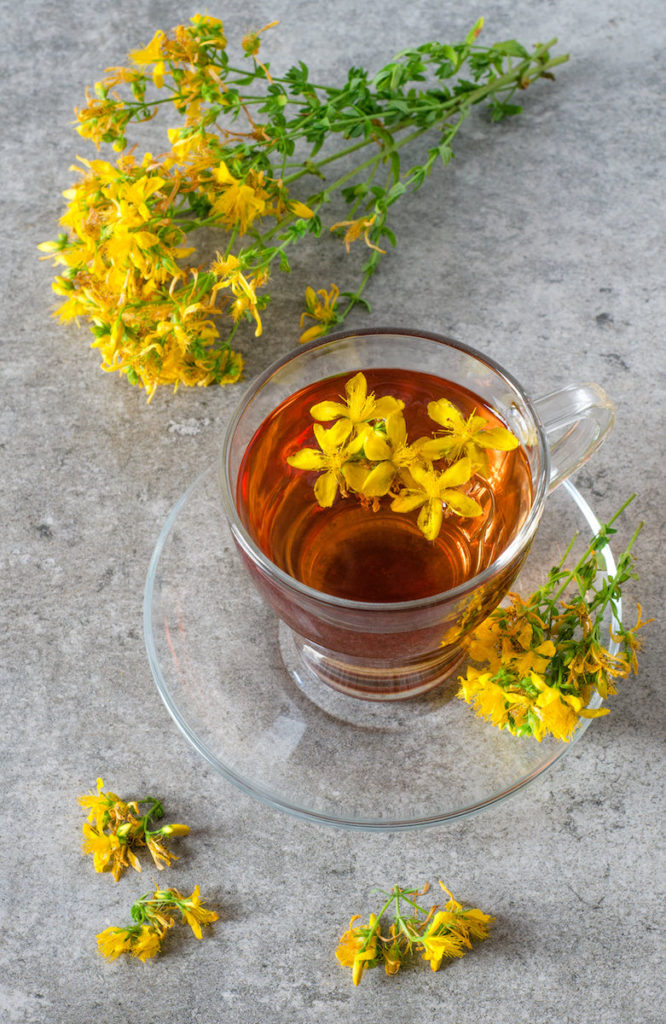
To benefit from the effects of St. John’s wort, numerous preparations can also be made at home and with simple means. For the preparation of teas, it is best to dry the whole St. John’s wort plant.
St. John’s wort oil is a supposed red oil that usually does not cause inflammation on the skin. The blossoms of St. John’s wort or the whole inflorescences are extracted for about 2 to 3 months in high-quality sunflower or olive oil. All homemade St. John’s wort preparations such as teas, castings, but also oils should always be processed thoroughly.
Last thought on St. John’s wort
St. John’s wort is one of our most important indigenous medicinal plants.
Together with marigold, peppermint, lemon balm, lavender and arnica, St. John’s wort is certainly one of the most important indigenous medicinal plants. St. John’s wort is currently one of the best-studied plants. The effectiveness of St. John’s wort as a natural antidepressant is truly a gift of nature, and anyone struggling with moderate or mild depressive moods may have found natural help in St. John’s wort.
FAQ
What happens when you go out in the sunlight with St. John’s wort?
Those who take St. John’s wort for treatment must additionally avoid sunlight as much as possible or stop the treatment. The medicinal plant contains the pigment hypericin, which in combination with UV rays makes the skin much more sensitive. Therefore, sunburn can occur more quickly.
How quickly can St. John’s wort take effect?
When taking St. John’s wort, remember that it takes 2 to 3 weeks to take effect.
How exactly does St. John’s wort work against depression?
The hyperforin from the fallen leaves and also the flowers is mainly responsible for the mood-lifting effect of St. John’s wort in moderate to mild depressive moods. It influences the activity of natural chemical substances in the brain in a comparable way to various artificial antidepressants.
Is an overdose of St. John’s wort possible?
Inappropriate use can lead to intestinal problems, allergies, impaired consciousness, complications, migraine, completely dry mouth as well as malaise. There is little information available on overdoses. In case of overdose, the following hazards exist: increased phototoxicity, complication states, seizures, clouding of consciousness, chills, high fever.
Is St. John’s wort bad for the liver?
It is suspected that St. John’s wort damages the liver in some people and also changes the liver values negatively. If you take it for a long time, you must keep an eye on your liver values. If you are taking solid medication, you should definitely consult your doctor before taking St. John’s wort.
How quickly is St. John’s wort broken down in the body?
The substances that make up the effect of St. John’s wort essence are broken down by the body within about 7-8 days after the end of treatment with St. John’s wort.
Does St. John’s wort affect high blood pressure?
St. John’s wort reduces iron absorption. It can increase the effect of MAO preparations and, from case to case, lead to hypertensive high blood pressure requiring first aid. St. John’s wort enhances the metabolic process of these drugs and thus reduces their effect.
How healthy and tolerable is St. John’s wort?
St. John’s wort has a beneficial effect on mental well-being, as it has both mood-lifting and antidepressant effects. It is also said to have a fundamental strengthening effect, which is why it is also used in cases of mental exhaustion or for recovery after serious illness.
Is St. John’s wort helpful for the skin?
It promotes the regrowth of the top layer of skin and is used for the supportive treatment of cuts and abrasions, swellings, strains, sunburn and spot treatment. It has additionally proven successful in the treatment of completely dry and split skin.
How high should the dosage of St. John’s wort be?
Only take St. John’s wort in measured doses! Whether a St. John’s wort preparation is over-the-counter or prescription-only depends on the area of application, not on the personal dosage or the package size. According to the German Medical Association, many over-the-counter food supplements containing St. John’s wort are underdosed.
Any person taking St. John’s wort as well as additionally various other medicines must talk to their doctor or pharmacologist about communication. St. John’s wort essences can change the effect of various other medicines, such as anticoagulants or HIV medicines.
The web content of ÁYIO-Q.com is for your information and in no case replaces a personal consultation or treatment by a qualified physician. The contents of ÁYIO-Q.com cannot and must not be used to make independent diagnoses or for self-medication.
Sources:
- Apaydin EA, Maher AR, Shanman R, et al. A systematic review of St. John’s wort for major depressive disorder. Syst Rev. 2016;5(1):148. Published 2016 Sep 2. doi:10.1186/s13643-016-0325-2
- European Medicines Agency (EMA): Hyperici herba. Online: https://www.ema.europa.eu/en/medicines/herbal/hyperici-herba (Abgerufen 03/2022)
- National Center for Complementary and Integrative Health (NIH): St. John’s Wort. Online: https://nccih.nih.gov/health/stjohnswort/ataglance.htm (Abgerufen 03/2022)
- Guillou, I. et al.: Medizin für Heilpraktiker, Haug Verlag, 2012
- Kasper S, Anghelescu IG, Szegedi A, Dienel A, Kieser M. Superior efficacy of St John’s wort extract WS 5570 compared to placebo in patients with major depression: a randomized, double-blind, placebo-controlled, multi-center trial [ISRCTN77277298]. BMC Med. 2006;4:14. Published 2006 Jun 23. doi:10.1186/1741-7015-4-14
- Linde K, Kriston L, Rücker G, et al. Efficacy and acceptability of pharmacological treatments for depressive disorders in primary care: systematic review and network meta-analysis. Ann Fam Med. 2015;13(1):69-79. doi:10.1370/afm.1687



